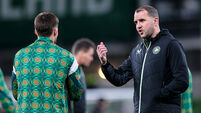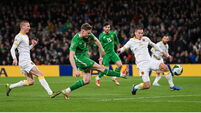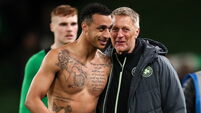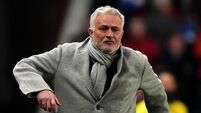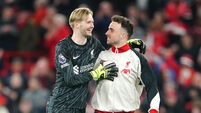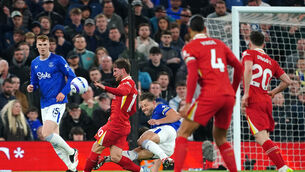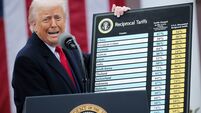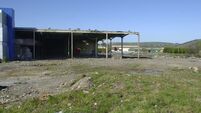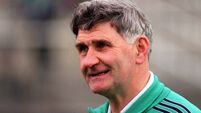Dion Fanning: Irish football’s tortured soul has never been further from salvation

Heimir Hallgrimsson seemed to spend the build up to Ireland’s two Nations League play off games against Bulgaria apologising. Pic: Stephen McCarthy/Sportsfile
In the late spring of 1986, the new Ireland manager Jack Charlton went to watch the League of Ireland champions Shamrock Rovers at Glenmalure Park. Rovers were on their way to winning a third championship in a row under Jim McLaughlin. They had a team of accomplished League of Ireland players but there was one many hoped would catch the eye of the new Ireland manager.
Charlton was as impressed by the performance of Liam O’Brien in the Rovers midfield as those spectators had hoped. O’Brien was selected for the Ireland squad for a friendly against Uruguay and would be part of the Ireland set up at the European Championships two years later.
When Charlton was asked about O’Brien afterwards, he spoke admiringly, but there was a sting. “Somebody,” Charlton said as he stood looking out at the most impressive ground in Irish football, “needs to take him away from all this.”
The tension between how the League of Ireland sees itself and how the international manager views it has been part of Irish football for generations. It would be tempting to say it began when Ireland decided to appoint international managers who hadn’t come through the domestic league. But those who did were often subject to the most scathing criticism from others within the small and, at times, cannibalistic world of Irish football.
Charlton never cared for their opinions — or anybody else’s — and in popularising football outside its heartlands, he created new constituencies. It may simply be coincidence that so many of those he had difficulties with during his time as manager — Liam Brady, David O’Leary, Liam Tuohy, Ronnie Whelan — were the blue bloods of Dublin football.
Their heirs can’t be ignored any more. With the League of Ireland rising and the Irish international team flatlining, there is a new stridency in how the domestic game views itself and wants others to see it.
Plenty would argue that little has changed in how it sees itself. But with crowds increasing and managers such as Damien Duff and Stephen Bradley prepared to articulate on its behalf, people beyond the old constituency are paying attention.
Heimir Hallgrimsson has seemed to spend the build up to Ireland’s two Nations League play off games against Bulgaria apologising. When he wasn’t, he was offering cups of tea and pints to managers like Duff and Bradley who had taken issue with his comments in December about Shamrock Rovers players getting a “career change” from the club’s success in Europe.
The reaction in some ways illustrated the new found confidence of the League of Ireland, in another, underlined its historic sensitivity. Irish players will always have ambitions to play abroad and Irish football, if it is to thrive, will need more deals like Mason Melia’s to Tottenham. There is no football industry in Ireland at the moment, but if there is one, it won’t be that unusual in this country in depending on an export market to prosper.
The response also illustrated a shift, if not of power, then of profile. Duff is a more significant person in European football than Hallgrimsson, who has taken some welcome steps as Ireland manager, but has yet to deliver the results which allow him to speak as an authority figure.
The international team isn’t helped by a combination of lowkey games like this week’s, whose importance most people can’t figure out, and high profile games, which they lose. Evan Ferguson’s struggles in the Premier League are another example of how far the team is from finding that transformational figure.
Without that energy, we fall back on the existential questions, interrupted only by trivialities. What has happened to Irish football? How can it be saved? Where will the players come from? Heimir, why were you on the Late Late Show when you could have been at Tallaght?
Of course, in some ways this is the stuff we should be talking about. The existential crisis is, well, existential. It is the heart of the matter and to be distracted by the day-to-day is to miss what is really important, like the editor who complained that the journalists in Saipan weren’t providing any injury news.
Read More
Any knocks could be the question asked constantly not of the players but of Irish football. It exists in a perpetual crisis of confidence. The League of Ireland offers some hope that there is a new energy but there is a long way to go.
In the meantime, the league considers splitting from the FAI and rejects a plan for further coaching from players which is either in line with best practice or a land grab, depending on your point of view.
When Giovannin Trapattoni was Ireland manager, he left repeating his statement that he had done very well considering he was managing in a country without a league. “There is not the tribune,” he said as he recalled the game he played for Milan in Athlone in 1975.
Trapattoni never changed his fundamental view, about this or anything else. Hallgrimsson is more accommodating and reasonable but he must privately wonder about the world he has stumbled into which at times can appear to be devoid of reason and perspective.
If he is not being asked to explain his failure to attend Premier League games and his love of Wyscout, he is answering to his other essentially trivial decisions. Whatever he chooses, it turns out he could have been doing something else. If he has that pint with Stephen Bradley, someone will wonder why he went to one pub when there is a good lounge in another.
Hallgrimsson made his comments about “career change" last December. In a viral world, Irish football can seem like a sole advocate for slow news, gently nurturing a grievance, returning to the subject endlessly, confident that nothing much will have happened in the meantime.
Yet the dysfunction of Irish football — these days specifically the FAI — remains the primary talking point, like a family Whatsapp consumed only by the habits of an increasingly doddery aunt who isn’t on the chat, but whose behaviour is what unifies the rest.
A League of Ireland manager has a pop at the FAI, we wait to see what a figure put forward from the FAI will respond with and on it goes. There are other things happening, of course, but these are the stories that capture people’s attention and perhaps that in itself is something to be noted.
We can talk about how Brexit provided an opportunity for Irish football, even if at the current pace Britain will have decided to rejoin the EU before Ireland gets it together to make the most of this opportunity. In the meantime, the failure to act in fact makes everything worse. Irish football has always been able to turn, not just a drama, but an opportunity, into a crisis.
Philip Roth wrote that “between pretension and fact lies a man’s tortured soul”. Irish football doesn’t have pretensions. Some might say it has notions but the more reasonable view would see it as ambition. But everyone would agree it is a tortured soul. Irish football is a long way from salvation and instead wrestles endlessly with the agonies of existence.
